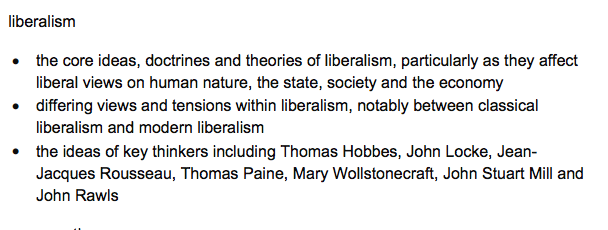
The government has unveiled plans to remove a section on feminism from the politics A-level syllabus.
The Department for Education has come under fire from campaigners for its proposed changes to the syllabus, which remove all mentions of feminism, sex, and gender.
Although the suffragette movement is mentioned in the proposed syllabus, it has been squeezed into a section on "pressure groups". And there is only one female political thinker mentioned by name – Mary Wollstonecraft – compared to six men.
Sophie Walker, leader of the Women's Equality party, said: "We are appalled at plans to remove the current teaching on feminism on the politics A-level syllabus, along with the topics of sex/gender, gender equality, and patriarchy.
"The political history taught to our children is already hugely biased in favour of men's achievements and institutions. The plan to shoe-horn feminism, one of the most important and ongoing political forces in modern history, under the banner of 'pressure groups' is both insulting and misguided."
Here is what the existing syllabus sets out for politics A-level students.

Students are expected to have a "knowledge of the core ideas, doctrines and theories of feminist thought, of tensions within feminism and of competing feminist traditions".
But in the proposed new syllabus, the feminism section has been removed. Instead there's a section on "pressure groups".

In the "liberalism" section, Wollstonecraft – regarded as the founder of feminism – is the only female "key thinker" mentioned.

Now a petition has been launched to make sure women are not "erased out of history".
Jacquelyn Guderley, who co-founded Stemettes, which aims to inspire girls into science and engineering careers, warned that women's voices were being "silenced".
She wrote on her website: "We are going through a huge feminist revival. Even if we weren't, our daughters and granddaughters, sons and grandsons, nieces, nephews, and families need to know about the movements and key female figures that got women to where they are today.
"If we know nothing of key social and political milestones – women gaining the right to matriculate and graduate from many universities in 1920 and gaining the right to vote in 1928 – how can we learn from them and progress?"
Former Liberal Democrat equalities minister Jo Swinson also warned against the changes.
Is removing feminism from the A Level Politics syllabus a good idea? https://t.co/oRfxiUpwof via @jacsgud
The government consultation closes on 15 December.
The Department for Education insisted it was for exam boards to set the detailed content of qualifications and schools were free to decide which figures they teach about.
A spokesperson said: "We are reforming GCSEs and A levels to ensure all pupils are equipped with the knowledge and skills they need to progress to further and higher education, access a wide range of jobs and succeed in a competitive global market.
"We want schools to highlight the issues faced by women from all walks of life and ages in history, including the work of key female political thinkers within the ideologies covered and in UK and global politics.
"We are carrying out a consultation on the new politics A level, and as always we will listen carefully to the views of the sector."
